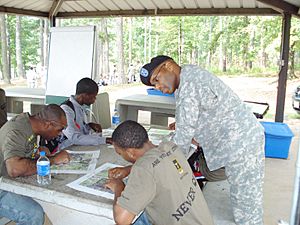Mentorship facts for kids

Mentorship is when an experienced person helps someone who is learning. It's like having a guide or a coach. The experienced person is called a mentor. The person learning is called a mentee.
Mentors share their knowledge and skills. They can help mentees grow and reach their goals. This can happen in many areas, like school, sports, or even life skills.
Contents
What is Mentorship?
Mentorship is a special relationship. One person, the mentor, has more experience. They share their wisdom with another person, the mentee. This helps the mentee learn and develop.
Who is a Mentor?
A mentor is someone who has been there before. They have knowledge or skills in a certain area. They guide and support the mentee. A mentor might be an older student, a teacher, a coach, or an adult in your community.
Who is a Mentee?
A mentee is the person who receives help. They are often younger or less experienced. Mentees are eager to learn and grow. They listen to their mentor's advice.
Why is Mentorship Important?
Mentorship offers many benefits for both the mentor and the mentee. It helps people learn new things. It also builds confidence and strong relationships.
Benefits for Mentees
- Learning new skills: Mentees can learn practical skills. This might be how to solve a math problem or how to play a sport better.
- Getting advice: Mentors can give helpful advice. They can share tips on school, careers, or personal challenges.
- Building confidence: With a mentor's support, mentees feel more confident. They are more likely to try new things.
- Exploring interests: Mentors can help mentees discover new hobbies or career paths. They can open up new worlds.
- Avoiding mistakes: Mentors can share their own experiences. This helps mentees avoid common pitfalls.
Benefits for Mentors
- Sharing knowledge: Mentors feel good about sharing what they know. It's rewarding to help someone else.
- Developing leadership: Guiding a mentee helps mentors improve their own leadership skills.
- Learning new perspectives: Mentees can sometimes offer fresh ideas. This can teach mentors new ways of thinking.
- Giving back: Many mentors enjoy giving back to their community. They want to help the next generation succeed.
Types of Mentorship
Mentorship can happen in different ways. It can be formal or informal. It can also involve one-on-one or group settings.
Formal Mentorship
Formal mentorship programs are organized. They often match mentors and mentees. These programs might be in schools, clubs, or workplaces. They usually have clear goals and a set time frame. For example, a school might have a program where older students mentor younger ones.
Informal Mentorship
Informal mentorship happens naturally. It's not part of an official program. You might find an informal mentor in a family member, a neighbor, or a coach. This kind of mentorship often grows over time. It is based on shared interests or mutual respect.
Peer Mentorship
Peer mentorship is when people of similar age or experience help each other. For example, a student who is good at science might help a classmate. They are both learning, but one has a bit more experience in a specific area.
Group Mentorship
In group mentorship, one mentor guides several mentees at once. This can happen in workshops or clubs. It allows many people to benefit from the mentor's experience. Mentees can also learn from each other in a group setting.
How to Be a Good Mentee
Being a good mentee is important. It helps you get the most out of the relationship.
- Be open to learning: Be ready to listen and try new things.
- Ask questions: Don't be afraid to ask for help or clarification.
- Be respectful: Value your mentor's time and advice.
- Be prepared: If you have a meeting, think about what you want to discuss.
- Follow through: Try to act on the advice you receive.
- Say thank you: Show appreciation for your mentor's help.
Mentorship is a powerful tool for growth. It connects people and helps them achieve their best.
Images for kids
-
William Blake's "Age Teaching Youth", a Romantic image of mentorship.
See also
 In Spanish: Mentoría para niños
In Spanish: Mentoría para niños







